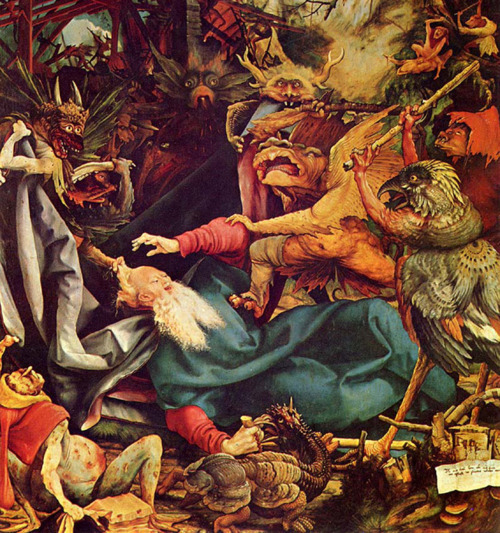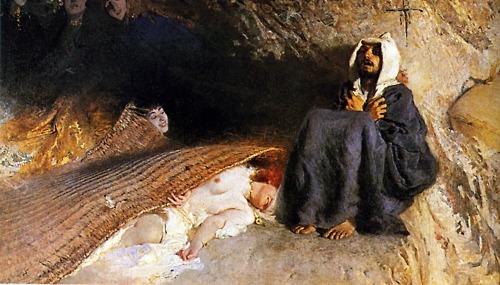Medieval Matters
The Fulton piece we read for Tuesday, and even the translations we read for today's class, really had me thinking about a class I took last year, "Demons, Melancholy and Madness." During a particular section of the course we talked about monastic life, and religious experiences described within them. I didn't realize how much the five senses played a part in these experiences until now, which I find very fascinating.

This is Saint Anthony of Egypt. We studied him extensively in this religion class on demons. He's considered the Father of Christian Monks because his life was written down by the Greek writer Athansius around 360 CE and many monks took after his example in terms of fasting and other monastic traditions. In a particular section of "The Life of Anthony," he is tempted by Satan a number of times while he is fasting in the Egyptian desert. There are a number of sensory components to this story. There have been many, many artistic interpretations of the Temptation of Antony, and they showcase how the Devil tempted Antony through components of the five senses.

(Matthias Grunewald's The Temptation of St. Anthony, 1510)

(Domenico Morelli's The Temptation of Antony, 1878)
Notice how these different paintings portray how the Devil tempts Saint Anthony. The Devil comes to Anthony in a number of forms, as visions of women who try to woo him (sight and hearing), and as demons that physically manifest themselves and tug at his hair and clothing (touch). The Devil comes to him multiple times, asking him what he would require to be happy, and all sorts of other questions that Antony answered only with teachings of the Bible or quotes from Jesus and God. Until taking this class, I really didn't think about how vital the five senses are in enticing us. They're so instinctual in our understanding of our surroundings, that the fact that Satan is so keen to use Antony's very human five senses against him. At one point to prove Antony is faithful to him, God actually gives Antony lashings (there's the sense of touch again), which even furthers Antony's resolve to keep away from the Devil.
The sense of taste, which we've predominantly talked about this last week, isn't really mentioned in the temptation of Antony by the Devil. However, taste--tasting food, rather--is something of which Antony is deprived. He deprives himself of eating except for the essentials, and goes out into the desert to become closer with God and therefore resist indulgences the Devil might provide or tempt him with:
Ain't no denying: monastic life is hard work.
This is Saint Anthony of Egypt. We studied him extensively in this religion class on demons. He's considered the Father of Christian Monks because his life was written down by the Greek writer Athansius around 360 CE and many monks took after his example in terms of fasting and other monastic traditions. In a particular section of "The Life of Anthony," he is tempted by Satan a number of times while he is fasting in the Egyptian desert. There are a number of sensory components to this story. There have been many, many artistic interpretations of the Temptation of Antony, and they showcase how the Devil tempted Antony through components of the five senses.

(Matthias Grunewald's The Temptation of St. Anthony, 1510)

(Domenico Morelli's The Temptation of Antony, 1878)
Notice how these different paintings portray how the Devil tempts Saint Anthony. The Devil comes to Anthony in a number of forms, as visions of women who try to woo him (sight and hearing), and as demons that physically manifest themselves and tug at his hair and clothing (touch). The Devil comes to him multiple times, asking him what he would require to be happy, and all sorts of other questions that Antony answered only with teachings of the Bible or quotes from Jesus and God. Until taking this class, I really didn't think about how vital the five senses are in enticing us. They're so instinctual in our understanding of our surroundings, that the fact that Satan is so keen to use Antony's very human five senses against him. At one point to prove Antony is faithful to him, God actually gives Antony lashings (there's the sense of touch again), which even furthers Antony's resolve to keep away from the Devil.
The sense of taste, which we've predominantly talked about this last week, isn't really mentioned in the temptation of Antony by the Devil. However, taste--tasting food, rather--is something of which Antony is deprived. He deprives himself of eating except for the essentials, and goes out into the desert to become closer with God and therefore resist indulgences the Devil might provide or tempt him with:
"He kept vigil to such an extent that he often continued the whole night without sleep; and this not once but often, to the marvel of others. He ate once a day, after sunset, sometimes once in two days, and often even in four. His food was bread and salt, his drink, water only. A rush mat served him to sleep upon, but for the most part he lay upon the bare ground."The reason Antony was so popular in the middle ages as an example is because he lived the simplest life he could. The Christian monastic life was essentially forged by him, and that is why monasticism is very much about deprivation, or denying the self. When we deny ourselves, what do we deny ourselves of? Experiencing the five senses at their fullest. We deny ourselves the touch of others. Or the taste of something sweet. Or the sound of good music when we have to be vigilant--for reasons religious or otherwise.
Ain't no denying: monastic life is hard work.

Does intentional sensory deprivation prior to sensual experience in fact enhance our experience of what get through our five senses once. That's what St. Anthony's example seems to suggest. Do things really taste "better" when we're hungry for them? It seems like there a kind of dynamic tension between not tasting and tasting, not touching and touching (a little like the "now my lover's here, now he's not, now he's back again" dynamic of the Biblical Song of Songs) that intensifies the "consummation" (consumption?) experience when it occurs.
ReplyDelete